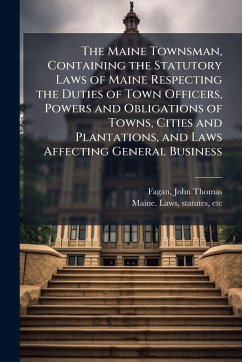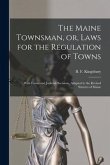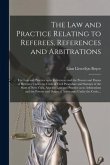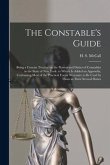"The Maine Townsman" is a comprehensive legal resource originally published in 1910, offering invaluable insight into the statutory laws of Maine as they pertain to municipal governance and general business practices. Edited by John Thomas Fagan, this volume meticulously details the duties of town officers, the powers and obligations of towns, cities, and plantations, and various laws affecting business operations within the state. This historical legal reference provides a snapshot of early 20th-century Maine, useful for legal historians, genealogists, and anyone interested in the evolution of American municipal law. While specific laws may have been superseded, the book offers an unparalleled view into the legal framework that shaped the towns and cities of Maine during this era. This edition preserves the original text, making it a valuable resource for historical research. This work has been selected by scholars as being culturally important, and is part of the knowledge base of civilization as we know it. This work was reproduced from the original artifact, and remains as true to the original work as possible. Therefore, you will see the original copyright references, library stamps (as most of these works have been housed in our most important libraries around the world), and other notations in the work. This work is in the public domain in the United States of America, and possibly other nations. Within the United States, you may freely copy and distribute this work, as no entity (individual or corporate) has a copyright on the body of the work. As a reproduction of a historical artifact, this work may contain missing or blurred pages, poor pictures, errant marks, etc. Scholars believe, and we concur, that this work is important enough to be preserved, reproduced, and made generally available to the public. We appreciate your support of the preservation process, and thank you for being an important part of keeping this knowledge alive and relevant.
Bitte wählen Sie Ihr Anliegen aus.
Rechnungen
Retourenschein anfordern
Bestellstatus
Storno








